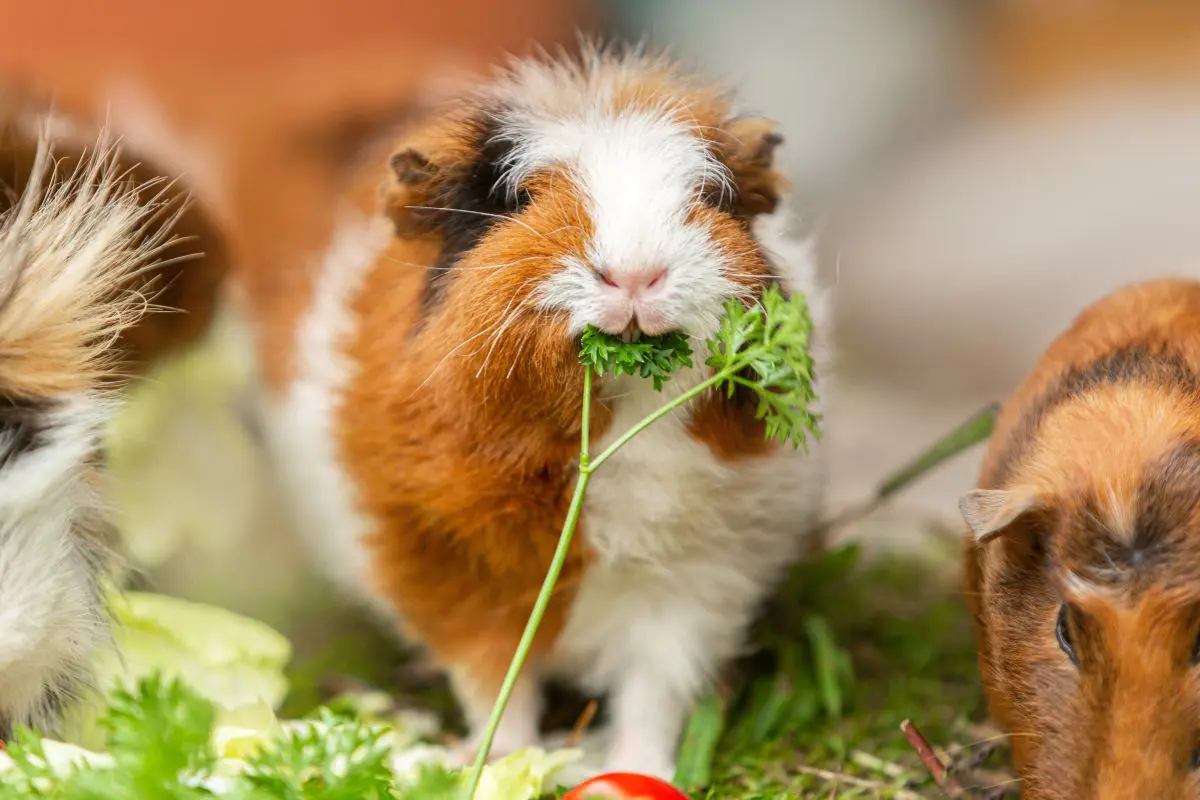Author: Tarra Freel, MS | Nutrition & Research Manager – Specialty Pets, Compana Pet Brands
Updated September 5, 2025
In the wild, ancestors of pet guinea pigs spend much of their waking hours foraging for food and consuming diverse vegetation [3][5][6]. Domestic guinea pigs require the same steady supply of fiber from plants to keep their gastrointestinal systems functioning properly [2].
A well-balanced guinea pigs diet is critical for maintaining digestive health, preventing obesity, and ensuring long-term wellbeing.
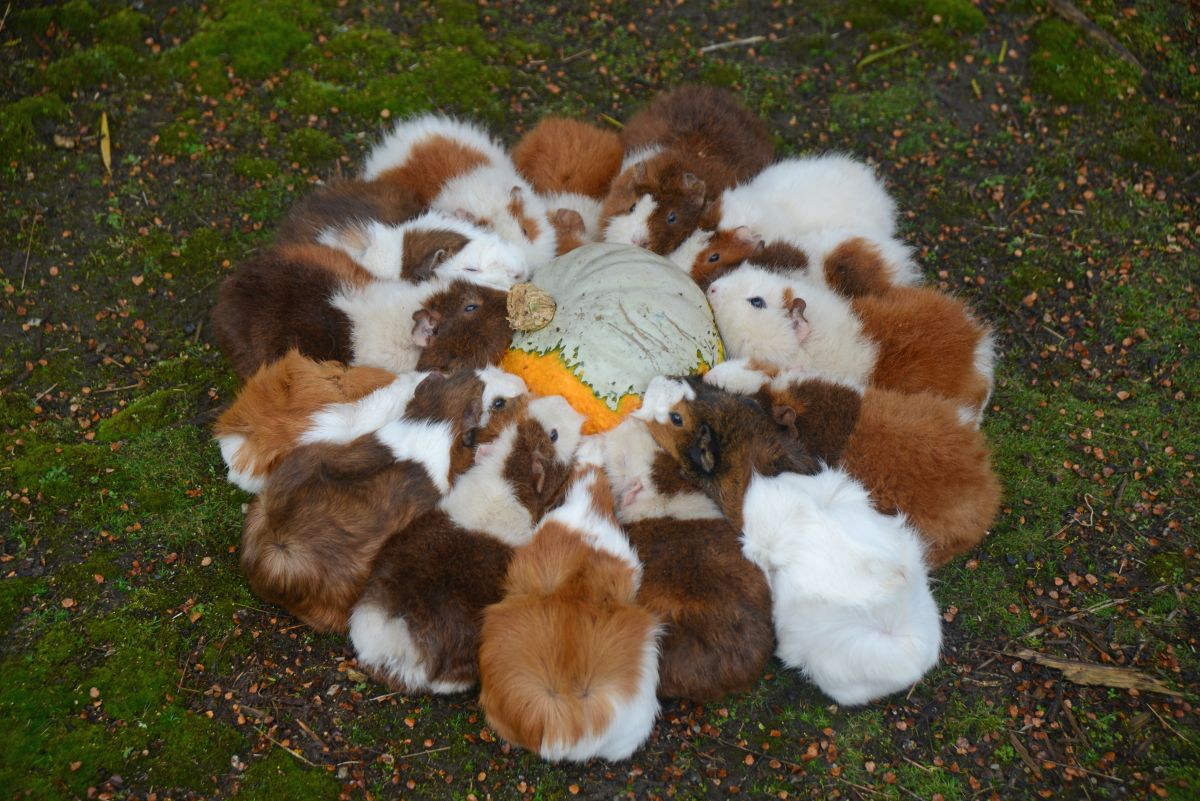
Guinea pigs are concentrate selectors, meaning they choose the most energy-dense plant material first. This instinct stems from their evolution as prey animals, where quick foraging minimized time spent vulnerable in the open.
While natural, this behavior can lead to selective feeding in captivity. Offering a uniform pellet diet helps ensure they get the right balance of nutrients.
What Food Is Best for Guinea Pigs?
A healthy daily diet for guinea pigs should look like this:
- 70% Grass Hay (Always Available): Timothy hay, orchard grass, or meadow hay are great choices. Young guinea pigs (<6 months) can eat alfalfa hay, but for adults it should be limited to occasional treats due to high calcium.
- 20% Fortified Pellets: Choose a uniform pellet designed specifically for guinea pigs to avoid selective feeding and ensure balanced nutrition.
- 8% Fresh Greens: Dark leafy greens such as romaine, cilantro, and parsley are ideal.
- 2% Treats: Small amounts of safe fruits and vegetables.
- Unlimited Fresh Water: Essential at all times.
This balance provides the fiber, vitamins, and minerals necessary for health and helps prevent gastrointestinal issues.
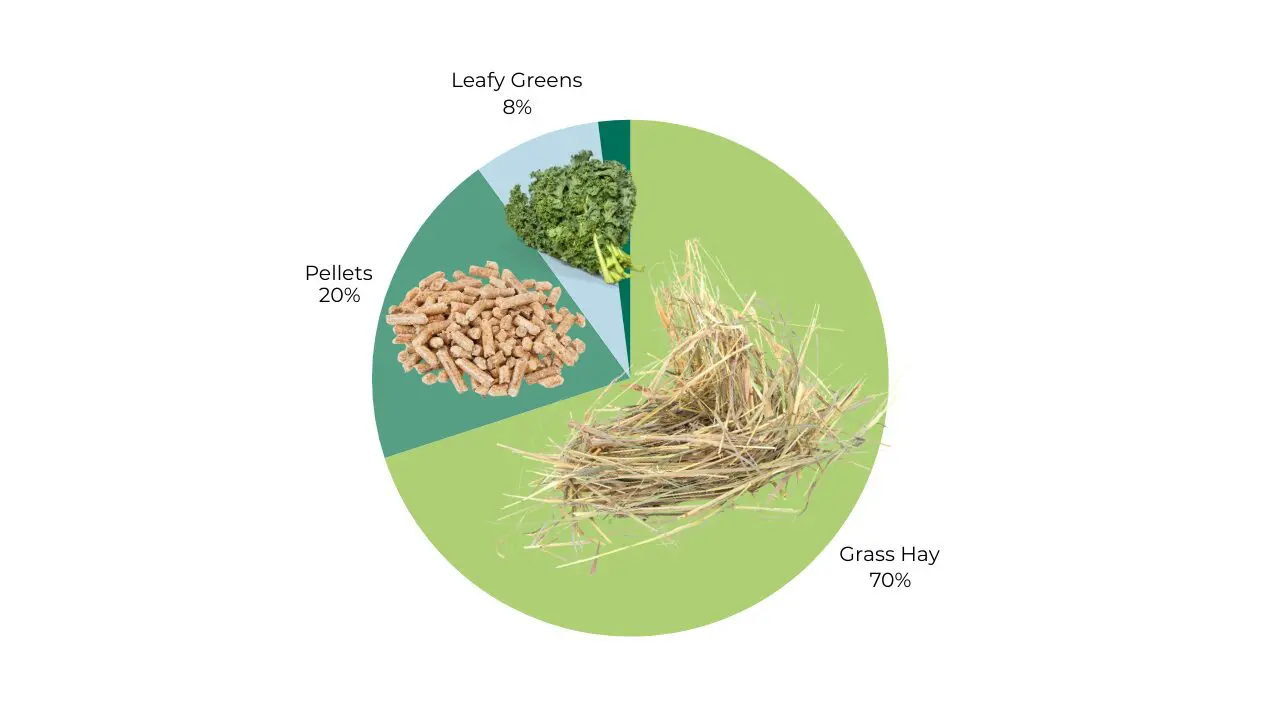
What Not to Feed a Guinea Pig?
Some foods can be toxic, harmful, or simply inappropriate for guinea pigs. A disruption in gut health can quickly become dangerous, so it’s important to know what to avoid. Foods guinea pigs should never eat include:
- Rhubarb
- Avocados
- Chocolate
- Hot peppers
- Raw potatoes
- Toxic houseplants
- Fruit seeds and pits
- Peanut butter or peanuts
- Onions, garlic, leeks, chives
- Animal proteins (meat, eggs, dairy)
- Tomato stems, leaves, and unripe tomatoes
- Highly processed foods (bread, pasta, chips, rice, crackers, cookies)
What Vegetables Can Guinea Pigs Eat Every Day?
Leafy greens should make up part of your guinea pig’s daily food. Options include:
- Parsley
- Cilantro
- Leaf lettuces
- Romaine lettuce
- Kale (in moderation due to calcium)
Vegetables such as bell peppers are also excellent: rich in vitamin C, which guinea pigs need daily. Avoid iceberg lettuce, which has little nutritional value.
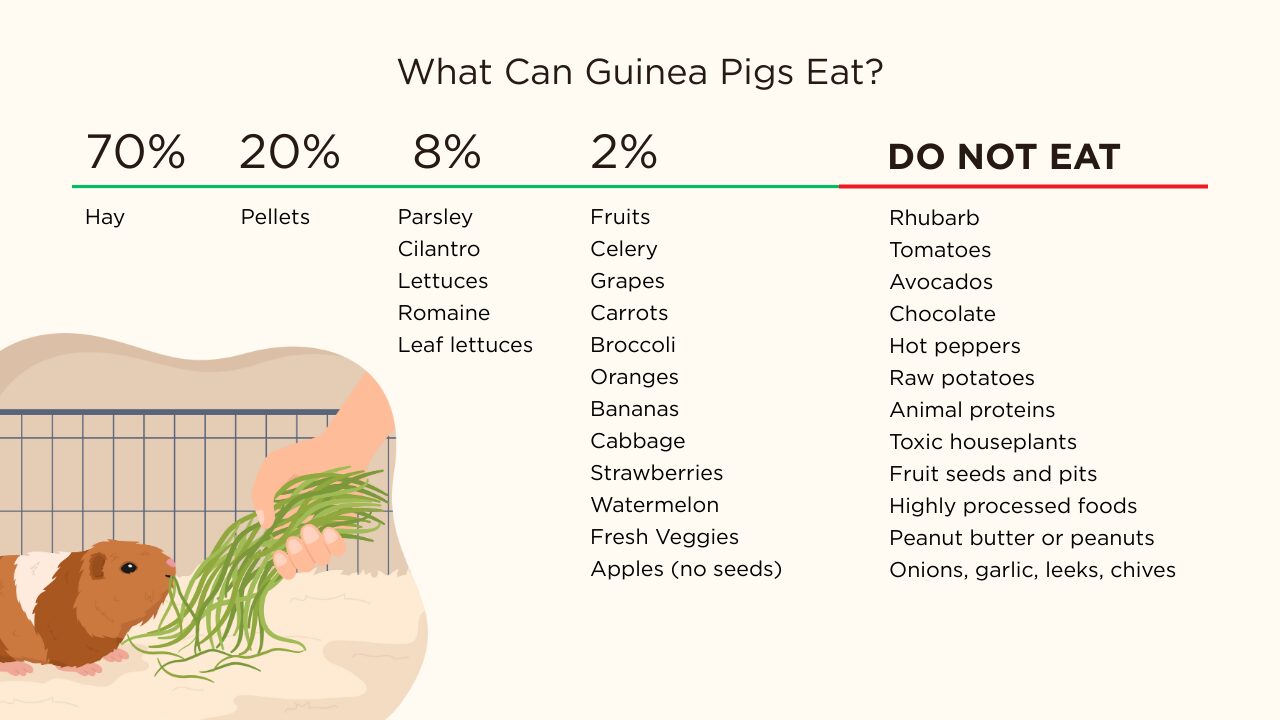
How Often Do You Feed Guinea Pigs?
Guinea pigs thrive on consistent daily feeding:
- Hay: Unlimited access at all times.
- Pellets: Measured portions (about 1/8 cup per pig, per day).
- Fresh Veggies: 1 cup per pig daily, divided between meals.
- Treats (fruits or special snacks): A few times per week, in moderation.
Because guinea pigs’ digestive systems need constant fiber, they should never go without food. Frequent nibbling on hay helps maintain both gut and dental health.
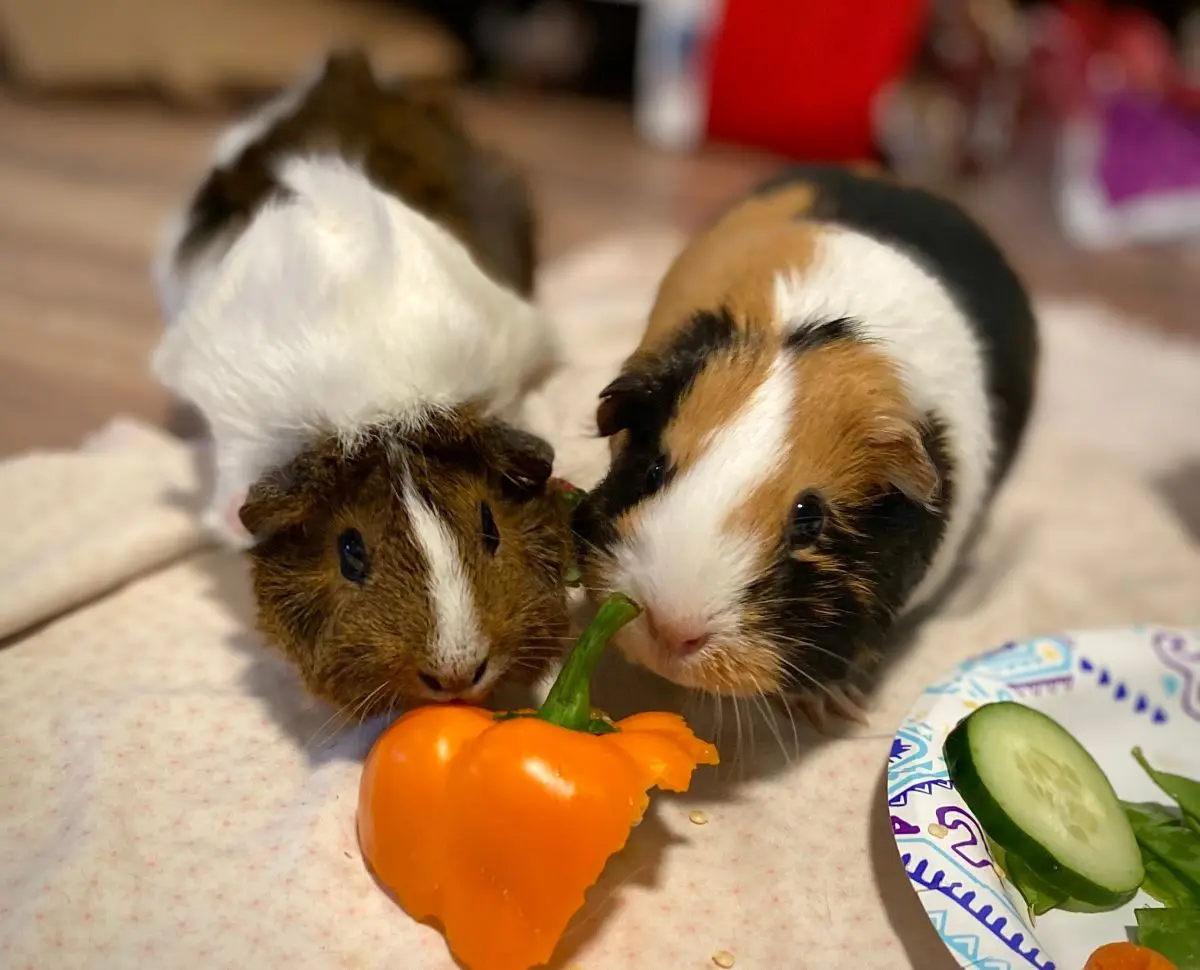
Can Guinea Pigs Eat…? (FAQs)
Here are quick answers to the most common questions about what do guinea pigs eat:
Can guinea pigs eat tomatoes?
It’s best to avoid feeding tomatoes to guinea pigs. While small amounts of ripe tomato fruit are not outright toxic, tomatoes are highly acidic and can cause painful mouth sores or digestive upset. The stems, leaves, and unripe tomatoes contain tomatine, a glycoalkaloid poison that can be harmful.
Because of these risks, many experts recommend offering other vitamin C–rich vegetables (such as bell peppers) instead of tomatoes.
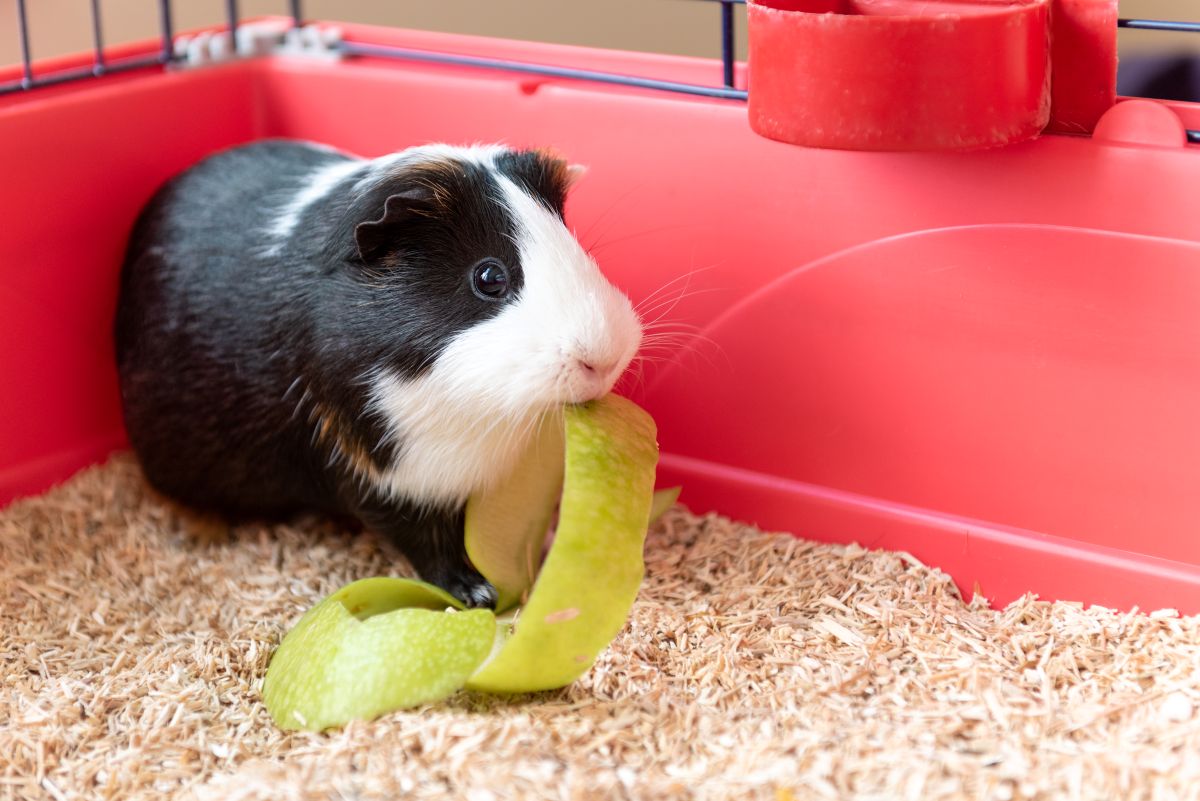
Can guinea pigs eat apples?
Yes, apples are safe in small amounts and can make a refreshing treat. Always remove the seeds and core, since apple seeds contain trace amounts of cyanide that can be dangerous.
A thin slice of apple skin-on, about the size of your thumb, once or twice a week is enough. Apples are high in sugar, so they should not replace daily greens or hay.
Can guinea pigs eat grapes?
Yes, grapes can be offered occasionally. Grapes are sweet and juicy, making them appealing to guinea pigs, but they’re high in sugar and should be limited. One or two small grapes, cut in half to avoid choking, is a safe portion once a week. Too many grapes may cause digestive upset or contribute to obesity.
Can guinea pigs eat bananas?
Yes, but bananas should be considered a rare treat. They are very high in sugar and starch, which can cause bloating, weight gain, or diarrhea if fed too often. Offer a thin banana slice once every couple of weeks. Remove the peel, as it may have pesticide residue unless organic.
Can guinea pigs eat celery?
Yes, guinea pigs can eat celery, but it must be cut into small pieces. Celery strings can pose a choking hazard, so chop the stalk into tiny chunks. Celery is hydrating and provides fiber but isn’t as nutrient-dense as leafy greens. You can feed it 1–2 times per week as part of a veggie mix, but don’t rely on it daily.
Can guinea pigs eat strawberries?
Yes, strawberries are safe in moderation. They are rich in vitamin C but also contain natural sugars. One medium strawberry or a few small slices once a week is a good serving size. Wash thoroughly to remove pesticides, and never feed the leafy tops unless you know they’re pesticide-free.
Can guinea pigs eat blueberries?
Yes, guinea pigs can enjoy blueberries as an occasional sweet snack. Blueberries are packed with antioxidants and vitamin C, but their sugar content means they should be limited. Offer 1–2 blueberries once a week. Overfeeding may cause soft stool or diarrhea.
Can guinea pigs eat watermelon?
Yes, guinea pigs can eat watermelon, but only in small portions. Watermelon flesh is mostly water and sugar, which can cause diarrhea if overfed. A small cube of watermelon flesh once a week is safe. Avoid feeding the rind and seeds, as they can upset digestion or pose a choking hazard.
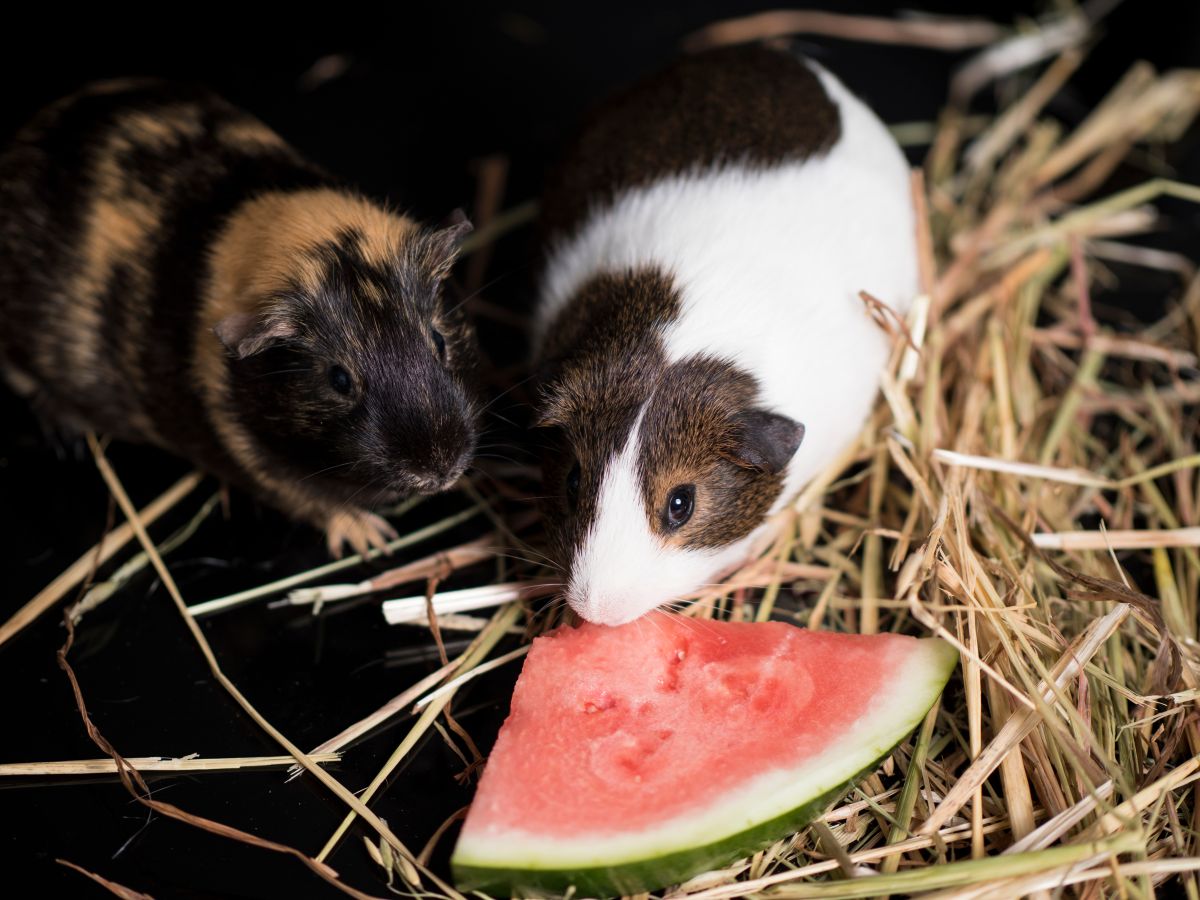
Can guinea pigs eat broccoli?
Yes, broccoli is safe but should be fed sparingly. Broccoli provides vitamin C, but it can cause gas and bloating in guinea pigs if eaten too often. A small floret or leaf 1–2 times per week is enough. Mix broccoli with other vegetables to balance out the risk of gas.
Can guinea pigs eat cabbage?
Yes, guinea pigs can eat cabbage, but moderation is key. Cabbage is high in vitamin C and fiber, but like broccoli, it can produce gas. Offer a few shredded leaves once or twice a week. Red cabbage contains more vitamin C than green, making it a slightly better choice.
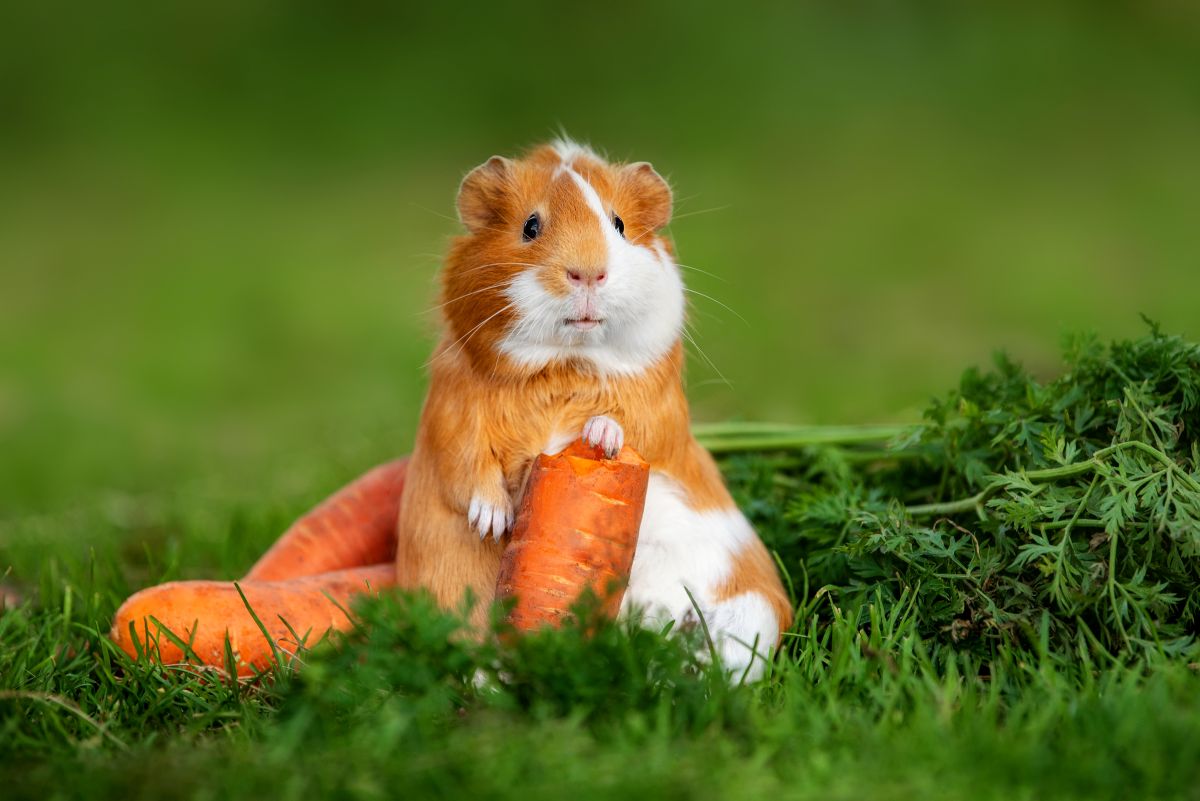
Can guinea pigs eat carrots?
Yes, carrots are safe and often loved by guinea pigs, but they should be treated as a sweet snack rather than a staple. Carrots are high in natural sugars and beta-carotene. A small baby carrot or a thin slice 2–3 times per week is a safe serving. Overfeeding carrots may lead to weight gain.
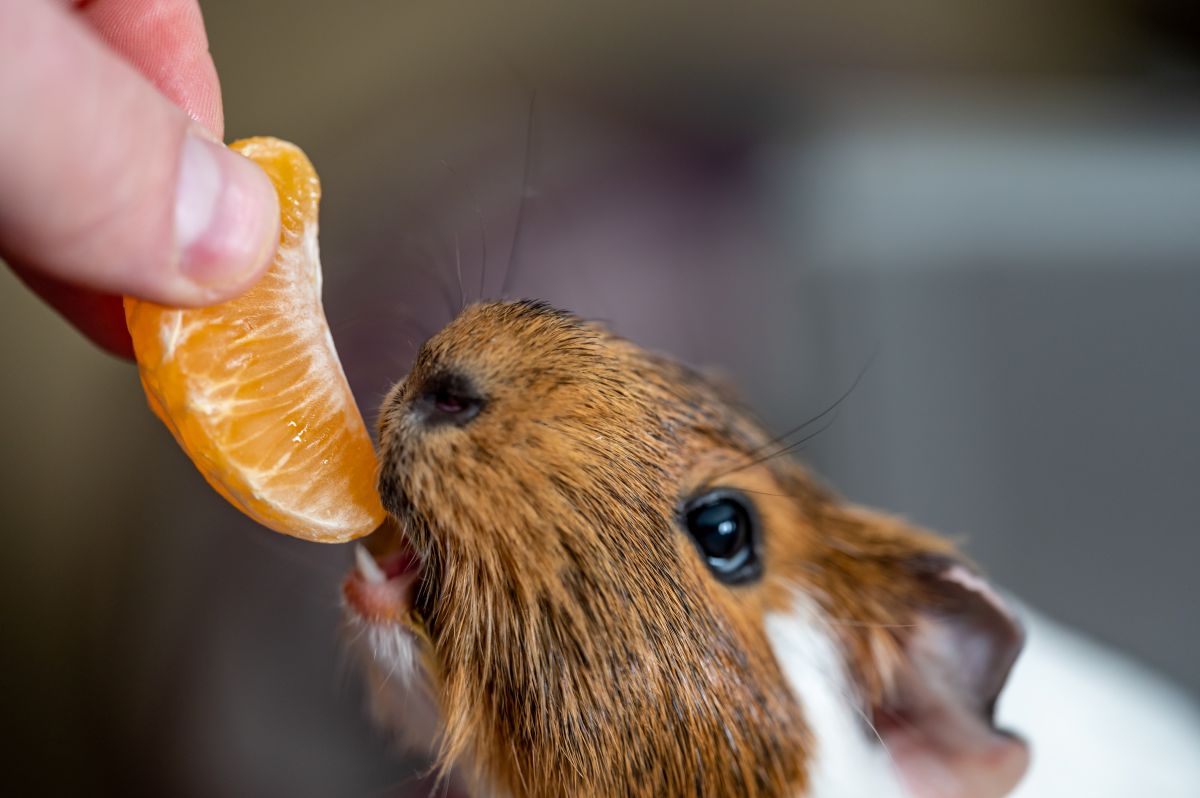
Can guinea pigs eat oranges?
Yes, guinea pigs can eat oranges, which are an excellent source of vitamin C. Offer a small segment, no more than the size of a teaspoon, 1–2 times per week. Too much citrus can irritate a guinea pig’s mouth and digestive system due to its acidity. Remove all seeds before serving.
Can Guinea Pigs Eat Animal Proteins?
As herbivores, guinea pigs do not have adequate enzymes to properly digest and utilize animal protein as omnivores and carnivores do. Thus, it is not recommended to feed your guinea pig meat, eggs, dairy, or other animal-derived proteins.
Doing so could cause digestive upset, dysbiosis (a shift in the microbiome -microbes live in the gastrointestinal tract of guinea pigs and many help with digestion), and increase the risk of obesity.
Can Guinea Pigs Eat Avocados?
Avocados contain a compound called persin which can be toxic to guinea pigs. Persin is found in all parts of the avocado including the fruit, skin, seeds, stem, and leaves. Toxic amounts of persin can damage a guinea pig’s heart muscle within 24 to 48 hours, potentially leading to congestive heart failure if not promptly treated [4]. For these reasons, guinea pigs should never eat avocados.
Can Guinea Pigs Eat Chives, Garlic, Leeks, or Onions?
Allium spp of plants include garlic, onions, chives, and leeks with garlic and onions being most reported for toxicosis. These plants contain sulfur-containing oxidants that are thought to be the cause behind hemolysis (destruction of red blood cells) that may occur after ingestion.
Hemolysis usually occurs 3-5 days after ingestion, and unfortunately, physical signs of Allium toxicosis are generally not noticed until significant hemolysis has occurred.
Symptoms of Allium toxicosis in guinea pigs may include:
- Anorexia
- Abnormally rapid breathing
- Rapid heartbeat
- Weakness
- Lethargy
- Collapse
Fatality may occur if hemolytic anemia is not treated promptly [4].
Can Guinea Pigs Eat Chocolate?
Similar to the risk in dogs and other mammals, chocolate can be fatal to guinea pigs and should be altogether avoided.
The toxic substances in chocolate are theobromine and caffeine. The lighter the chocolate, the lower the risk of toxicity, but for pigs, all chocolate should be avoided. White chocolate contains insignificant amounts of these compounds but still shouldn’t be fed to guinea pigs due to its high sugar and fat content.
Toxic amounts of chocolate can result in central nervous disturbances and life-threatening heart rhythm abnormalities, as theobromine is a cardiac stimulant and diuretic.
Symptoms of toxicity in guinea pigs may include:
- Diarrhea
- Restlessness/hyperactivity
- Trembling
- Difficulty getting comfortable
- Tachycardia (elevated heart rate)
- Hyperthermia (elevated temperature).
Signs of chocolate toxicity usually appear 6-12 hours after ingestion and it can be fatal if not treated promptly [4].
Can Guinea Pigs Eat Fruit Seeds or Fruit Pits?
Guinea pigs can eat apples and other fresh fruits in small quantities as an occasional treat. Before offering your guinea pig his favorite slice of green apple, however, make sure to remove all seeds and pits.
Most fruits are safe in small amounts, but the seeds and pits from many fruits contain trace amounts of cyanide. While amounts of cyanide in seeds/pits may be very low, it’s best practice to avoid feeding them all together as they can also pose a choking hazard.
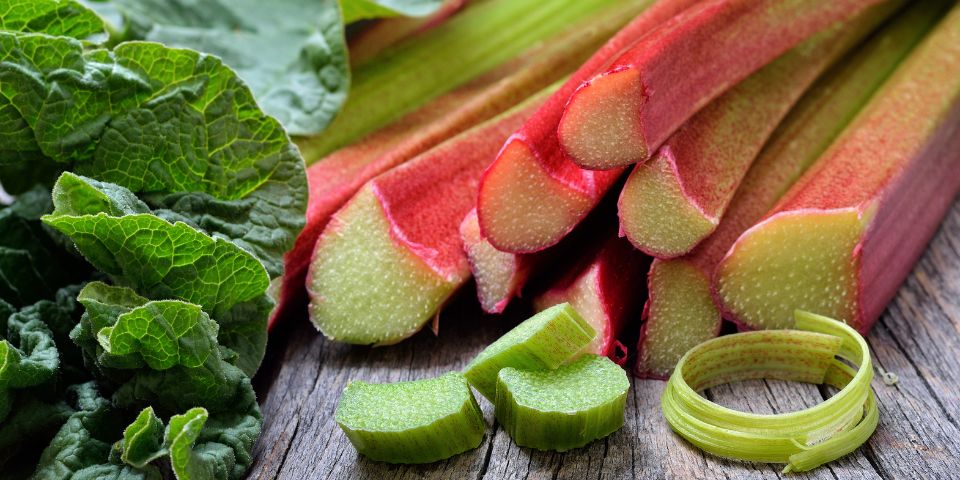 Can Guinea Pigs Eat Rhubarb?
Can Guinea Pigs Eat Rhubarb?
Rhubarb contains a high concentration of oxalic acid which, if consumed in high quantities, can interfere with calcium absorption and have other toxic effects. In guinea pigs, the oxalate can bind to calcium and potentially form bladder stones which can be very painful. Avoid feeding rhubarb to your guinea pig at treat time and opt for a small amount of more guinea pig-friendly dark leafy greens instead.
Can Guinea Pigs Eat Processed Foods?
While not necessarily toxic, many highly processed human foods such as bread, pasta, chips, rice, crackers, and cookies can still pose a threat to your guinea pig and are not nutritionally appropriate. Many of these foods are very high in the type of carbohydrates that should be kept to a minimum for guinea pigs – starches and sugars. Feeding these types of foods to your guinea pig can cause digestive upset and increases the risk of obesity.
Fortunately, there are more species-appropriate treats to share with your guinea pig such as small amounts of fresh fruits, and good quality manufactured treats that contain fruits and veggies. Avoid treats that contain artificial colors, flavors, or preservatives.
Additionally, there are a variety of leafy greens and leaf lettuces that guinea pigs can and should eat daily. Many guinea pigs love greens so much they will consider these healthy foods a treat when offered alongside their grass hay and guinea pig pellets!
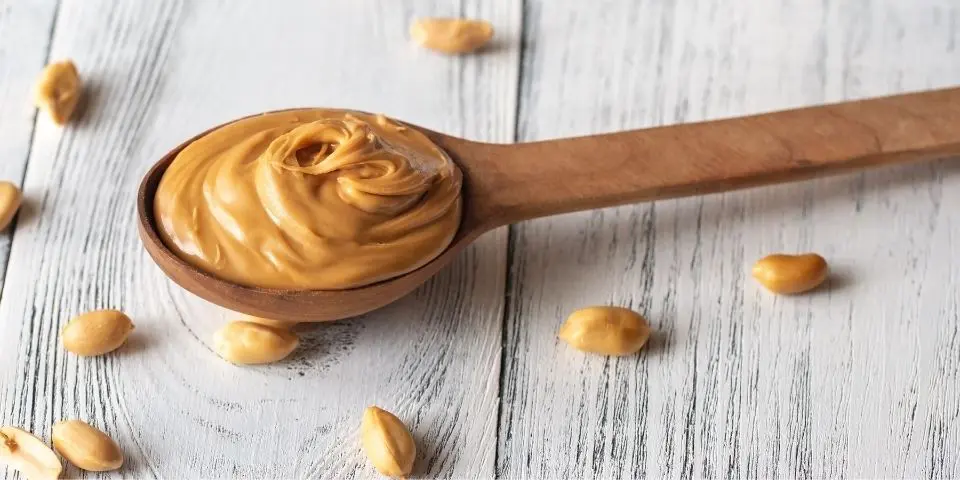 Can Guinea Pigs Eat Peanut Butter?
Can Guinea Pigs Eat Peanut Butter?
There are several reasons that you should not offer peanut butter to your guinea pig. For one, peanut butter is high in fat, making it less than ideal for your guinea pig, and in many cases is also high in sugar. Peanut butter also presents a choking hazard due to its thick, sticky consistency. Similarly, whole peanuts are also not recommended for your guinea pig.
Can Guinea Pigs Eat Raw Potatoes?
Raw potatoes contain an alkaloid called solanine which can be toxic to some small mammals. Ingesting solanine can lead to digestive upset, abdominal pain, decreased appetite, and lethargy. Potatoes are also very high in starch which can potentially lead to serious digestive issues in guinea pigs when consumed in significant quantities.
 Can Guinea Pigs Eat Hot Peppers?
Can Guinea Pigs Eat Hot Peppers?
The compound capsaicin is what makes hot peppers hot and it can also irritate the digestive system. You should never intentionally subject your guinea pig to hot peppers such as chili peppers or jalapeno peppers as this could lead to digestive upset. Bell peppers of all colors, on the other hand, are a great choice for guinea pigs!
Can Guinea Pigs Eat House Plants?
Though not something humans view as food, house plants can look very appetizing to guinea pigs. In fact, some devoted guinea pig owners grow pig-friendly varieties of houseplants specifically for their pets to enjoy. With that said, some species of house plants are toxic to guinea pigs, so it’s best to keep all house plants out of the reach of your pet unless you’re well-researched in which varieties are safe [1].
References
Holowaychuk, M. K. (2006). Renal failure in a guinea pig (Cavia porcellus) following ingestion of oxalate containing plants. The Canadian Veterinary Journal, 47(8), 787.
Kohles, M. (2014). Gastrointestinal anatomy and physiology of select exotic companion mammals. Veterinary Clinics: Exotic Animal Practice, 17(2), 165-178.
Lord, E., Collins, C., deFrance, S., LeFebvre, M.J., Pigière, F., Eeckhout, P., Erauw, C., Fitzpatrick, S.M., Healy, P.F., Martínez-Polanco, M.F. and Garcia, J.L. (2020). Ancient DNA of guinea pigs (Cavia spp.) indicates a probable new center of domestication and pathways of global distribution. Scientific reports, 10(1), 1-9.
Merck & Co., Inc. (2006). The Merck Veterinary Manual (8th edition). Whitehouse Station, NJ: Merck & Co., Inc.
Navia, J. M., & Hunt, C. E. (1976). Nutrition, nutritional diseases and nutrition research application. In Biology of the Guinea Pig, J. E. Wagner and P. J. Manning (Eds.), (pp. 235-265). New York: Academic Press.
Weir, B. J. (1974). Notes on the origin of the domestic guinea pig. In The Biology of Hystricomorph Rodents, I. W. Rowlands and B. J. Weir (Eds.). New York: Academic Press.

